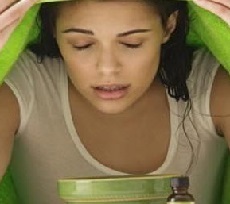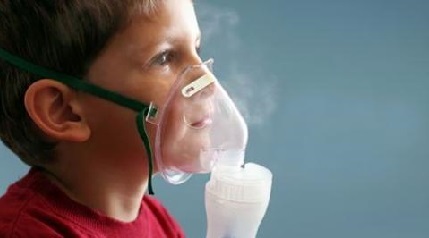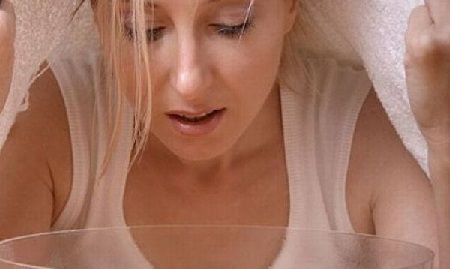 Sinusitis - an inflammatory process, localized on the mucosa of the maxillary sinuses. It can be one-sided and bilateral, proceed in acute and chronic form. This pathology can develop in patients at any age, the causes of the inflammatory process in the maxillary sinus can be any other diseases of closely located ENT organs and infections.
Sinusitis - an inflammatory process, localized on the mucosa of the maxillary sinuses. It can be one-sided and bilateral, proceed in acute and chronic form. This pathology can develop in patients at any age, the causes of the inflammatory process in the maxillary sinus can be any other diseases of closely located ENT organs and infections.
Inhalations are an excellent treatment for colds, viral diseases, including sinusitis. This method of treatment is especially effective at the first symptoms of the disease - nasal congestion, shortness of breath, etc. Official medicine fully supports this procedure.
At home, inhalation with sinusitis can be carried out on decoction of medicinal herbs. Also, conventional saline solution, essential oils, bee products and other medicines that have anti-edematous, bactericidal action are used as a basis.
Symptoms of
The main symptoms of acute sinusitis are:
- nasal congestion;
- headaches( especially if they are worse when the head is tilted);
- pain and a feeling of heaviness in the area of the maxillary sinuses( on the side of the wings of the nose);
- reduction of smell;
- increased body temperature( usually up to thirty-seven to thirty-eight degrees);
- nasal discharge can be both mucous( transparent) and purulent( yellow or green).
The sooner the treatment of sinusitis begins, the more effective it will be. In addition to drug therapy, nasal and inhalation can be effective.
Advantages of treatment with nebulizer
Treatment with nebulizer has a number of advantages over other methods of :
- breathing relief through nasal passages;
- dilution and excretion of accumulated mucus and pus;
- getting the drainage effect;
- simplicity and ease of use;
- possible use for the treatment of young children.
Among the most common devices are the following:
- Compressor .Capable of spraying drugs into a fine-dispersed cloud through airflow. Such devices allow the use of almost any solution.
- Mesh nebulizers .Their feature is that ultrasonic waves create a special grid, which is designed in such a way as not to destroy important components of the drugs.
- Ultrasound .Forming an effective cloud with the help of ultrasonic waves created by a special membrane in a glass with medicine.
The nebulizer allows the drug to split into small particles and penetrate deeply into the nasal cavity and the maxillary sinuses. Inhalations in sinusitis are intended for the administration of vasoconstrictor drugs, antibiotics and other liquid medicines.

How to properly administer the inhalation of
In order for inhalations of maxillary sinusitis to maximize the benefit and do no harm, adhere to such recommendations :
- Before using inhalers, it is necessary to clean the nose;
- Healing steam should be gently inhaled through the mouth, exhaling through the nose;
- Inhale the vapor carefully so as not to damage the mucous membranes of the mouth.
- Therapy should be done twice a day: morning and evening;
- The course of inhalations is mainly carried out from 7 to 10 days;
In genyantritis, it is not necessary to perform inhalations without medical indications, these procedures should be prescribed by a specialist after the examination. First of all, the doctor reveals whether the patient has contraindications to the administration of inhalations in sinusitis, including hypersensitivity to drugs that can be used for procedures.
Inhalation medications for sinusitis with nebulizer
Inhalations with maxillary sinusitis are an indispensable method of treatment at home. Such inhalations are practically devoid of any shortcomings and have a lot of advantages.
The nebulizer splits the droplets of the drug to the smallest particles, allowing you to enter the remotest parts of the respiratory tract. As a medicine for inhalation, you can use a variety of drugs, we list some of them.
Combined:
- Polydex - has vasoconstrictive properties and contains in its composition a hormonal drug( dexamethasone) and two antibiotics that provide anti-inflammatory and antibacterial effect;
- Rinofluimycil - has vasoconstrictive and secretolitic properties, accelerates the restoration of the mucosa;
- Tonsilong H - has antimicrobial and anti-inflammatory properties.
Topical antibiotics:
- Bioparox;
- Gentamicin;
- Tobramycin;
- Isophra;
- Dioxydin;
- Streptomycin.
Immunostimulants:
- Interferon;
- Derinat.
In order to conduct the inhalation, first you need to pour 2 ml into the nebulizer.solvent, and then add the number of drops that the doctor prescribed. Distilled water, as a solvent, should not be used, as it can cause a coughing attack. It is better to use a saline solution, for example, saline solution, which must be heated to a temperature of 18-19 degrees.
Do nebulizer inhalations should not be earlier than a couple of hours after active physical activity. You can not smoke or drink alcohol before the procedure. In addition, during the course of procedures, it is necessary to cancel the use of expectorants if they have been prescribed earlier. During the procedure, you should breathe smoothly and slowly.
Steam inhalation with folk remedies
In case of genyantritis, steam inhalations are often carried out with folk remedies, because, thus, the active substances of medicinal plants go deep into the maxillary sinuses and have a therapeutic effect on the nasal mucosa. In addition, no additional devices are required for this.
At home, you can use herbal collections for inhalation:
- Steam inhalations with propoliso m are very simple and effective enough. For them, a pitch of propolis is needed, which is placed in a container with purified boiled water. When the container is heated, therapeutic pairs of propolis are extracted, which are inhaled. In addition to the net pitch for inhalation, propolis tincture is also used, which is sold in pharmacies. For the procedure, a standardized tincture containing 80% alcohol solution is mixed with an isotonic solution in a ratio of 1:10, then placed in a steam inhaler or heated in a water bath.
- It is necessary to take 30 large laurel leaves and pour them with one liter of boiling water , boil them for 5 minutes at low heat and leave to infuse for 50-60 minutes. After this, you can begin to inhale the resulting decoction. Boil potatoes in the uniform of .After he cooks, take a towel, bend over the pan, cover his head with a towel. For ten minutes, inhale the potato steam first with the nose, then with the mouth. At the end of the procedure, it is advisable to drink tea with honey and lemon.
- Connect 1 part of celandine with St. John's wort, 2 parts of chamomile flowers, 3 parts of Yarrow .From the mixture you will need 2 tbsp. Spoon a glass of boiling water and insist for 30 minutes.
- Mix the pieces of balm( mint), psyllium and celandine in 3: 2: 2 ratio of , pour 2 tablespoons of the collection with hot water( 1 glass).Half an hour later, you can start inhalation.
- In 500 ml of boiling water, drip 5 drops of essential oil ( mint, pine, cedar, eucalyptus, tea tree, etc.).Make inhalation.
- For an cold inhalation, take the onion and rub it on a grater until the consistency of the pulp .A person does not need to bother with the complicated preparation of the recipe or tolerate the effect of hot steam under the blanket. Phytoncides of onions penetrate into the nasal passages themselves during its rubbing.
- Mix walnut leaves with yarrow and psyllium in a ratio of 1: 2: 3, pour 250ml of boiling water, insist an hour and do inhalation in the traditional way.
The duration of the procedure is about 10-15 minutes and is determined individually for each patient. In most cases, inhalations for sinusitis are performed for 7-10 days at home.

Contraindications
As with any procedure, nebulizer inhalation may be contraindicated in certain diseases and conditions:
- early after a stroke or myocardial infarction;
- body temperature above 37.5 ° C;
- decompensated form of cardiovascular failure;
- arrhythmia;
- pulmonary hemorrhage;
- bullous emphysema;
- pneumothorax.
When appointing any inhalation, the attending physician must take into account the age of the patient, the nature of the course of the disease, the accompanying pathologies, and chronic diseases.

How to choose probiotics for the intestines: a list of drugs.

Effective and inexpensive cough syrups for children and adults.

Modern non-steroidal anti-inflammatory drugs.

Review of tablets from the increased pressure of the new generation.
 Antiviral drugs are inexpensive and effective.
Antiviral drugs are inexpensive and effective.



